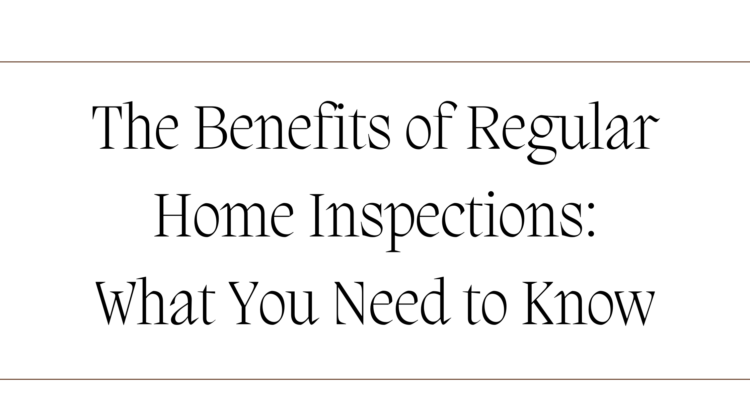
The Benefits of Regular Home Inspections: What You Need to Know
Purchasing a house is one of the most natural giant steps in life, but it bears the responsibility of periodic maintenance to hold its value and ensure safety. While many homeowners focus on mundane tasks like cleaning and yard management, paramount tasks often overlooked include the regular home inspection.
Anyone can benefit from a home inspection, not only those in the market to purchase or sell. Regularly maintaining one is a great way to ensure your investment lasts and keeps your family secure. This blog will discuss some benefits of regular home inspections and why they should form part of your house maintenance routine.
What is a Home Inspection?
A house inspection involves a trained eye examining every part of the building, from the basement to the attic. It seeks to discover everything that needs repair or replacement so that you, the prospective owner and your mortgage lender can be aware of all issues that may impact the home’s worth. You want to arrange an inspection once your offer has been accepted or before finalizing building plans. That way, the more time there is, the earlier you find the problems and the more time you have to fix them.
Why Regular Home Inspections are Essential
It is not just the homebuyers but also the current homeowners who can benefit from regularly checking homes. Such inspections help retain the value of your home, maintain safety, and ensure all the necessary legal or insurance-related compliances. The homeowners could now avoid costly repairs and improve the quality of their property by being proactive.
The Benefits of Regular Home Inspections
Early Detection of Issues
One important advantage of frequent home inspections is spotting problems early. Built-up problems are usually expensive; thus, early identification may save a house owner the money they could have used on the issue before it becomes a major repair. For example, when leakage in the roof is detected at the onset, it can be easily fixed inexpensively, unlike when neglected and needs significant maintenance with extensive water damage that is costly to repair.
Ensuring Safety
Safety is a must in every home, and inspections ensure that all safety systems, including electrical elements, plumbing systems, and other structural parts, are all properly fitted. Hazardous practices become common in homes with faulty wiring, gas leakage, or weakening structures, circumstances which an inspector can point out, allowing the owner to correct the problem before calamity strikes their family. When it comes to a plumbing problem, hiring a professional plumber is advised to ensure the issue will be fixed properly.
Maintaining Property Value
A well-maintained house retains value in the marketplace much more than a house not cared for. Throughout, frequent inspections and follow-ups with maintenance leave a home in prime condition, making it most suitable for buyer interest. Houses with regular inspection and maintenance records usually get higher appraisal values, giving good returns on their sale.
Planning for Future Repairs
A home inspection can make one understand the condition of their home and adequately plan for future repairs. Knowing what needs to be repaired will allow the homeowner to budget and ensure they continue the work. This enables one to avoid surprises by structuring priorities and ensuring the home remains in tip-top condition over some time.
Peace of Mind
Knowing your home is in good condition brings immense peace of mind. One will have the assurance and confidence derived from frequent inspections: all systems are running well, and there are no surprises lying in wait to spring on one. It reduces stress and allows people to enjoy their property without the nagging feeling of worry at the back of their minds.
Enhancing Home Insurance Claims
Detailed inspection reports in these cases of house damage or loss would make the process easier when filing an insurance claim. Such documentation from regular inspections serves as proof of the state of your home before the incident. It thus substantiates a claim that may help speed up its settlement.
Improving Energy Efficiency
Energy inefficiency can thus be noted in home inspections. Congressional issues such as inadequate insulation, outdated and inefficient heating and cooling systems, and drafty windows and doors are typically identified by inspectors. Correcting these problems can save thousands of energy bills and create a much more comfortable living space.
Compliance with Local Regulations
Local codes and regulations are subject to change over time. Periodic home inspection can keep your home pace with any changes in the regulation. Otherwise, fines and litigation can result when a claim is filed. Keeping current with local requirements will also serve the dual purpose of ensuring that the property abides by all the safety standards and retains its value.
How Often Should You Have a Home Inspection?
The frequency of home inspection is determined by parameters such as the age of the home, weather trend conditions in your location, and whether it has undergone recent renovations and repairs. Generally speaking, every 2-3 years is recommended. However, older homes or those with severe weather conditions may warrant more frequent inspections.
Choosing the Right Home Inspector
Choosing the right professional to inspect a home can ensure accurate and reliable results. Select inspectors certified by associations like the American Society of Home Inspectors (ASHI) or the International Association of Certified Home Inspectors (InterNACHI). Experience and previous clients’ happy testimonials should be considered as well when choosing a good home inspector.
The Home Inspection Process: What to Expect
A home inspection typically includes the following steps:
- Preparation: The owner should make every part of the house accessible.
- Inspection: Inspect the property and test all major systems and components.
- Report: Following the inspection, the inspector produces a full report identifying any faults discovered.
- Follow-Up: Based on this report, homeowners can ask questions and plan for necessary repairs.
Conclusion
One of the major concerns involved in being a homeowner is scheduled home inspections. These include early detection of problems, ensuring safety, property value maintenance, and peace of mind. A regular inspection will help the owner protect his investment, plan for future repairs, and enjoy his home free from hidden problems. Regular home inspection is essential to ensure the longevity and well-being of your property.

